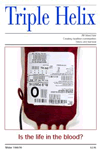Cyberdoc reviews the Medical Web and initiates a new service for interested Christians
The Internet is attracting interest even in such periodicals as the British Medical Journal. In 1997 a BMJ article examined the Internet's advice on the treatment of feverish children. The research discovered that the advice found was inconsistent with official guidelines. This finding should cause no surprise - eavesdropping on parents discussing treatment would produce similar results. The real concern is, whose advice will people follow?
More recently, another BMJ article reluctantly acknowledged that the role of the Internet in 'fostering open debate without censor-ship' meant that filtering of information before it was published was impossible. To attempt this would be like trying to stop someone spreading misinformation by telephone.
The Internet allows anyone with access to a computer a potential mass audience worldwide. Rapid distribution of misinformation can occur. An official medical site like the Royal College of Psychiatrists can look rather unimportant compared with a site like schizophrenia.com put together by volunteers. But we cannot totally rely on such a site.
The more recent BMJ article suggests that web page reviews by suitably qualified readers be used by Internet software to deliver appropriate information. This is some way off and at the moment it is hard enough to find information that is relevant let alone guaranteed accurate! It can be even be hard to find journals such as The Lancet, the Journal of the American Medical Association or the New England Journal of Medicine on the web. Links to these journals, as well as the BMJ and a long list of other medical journals, are now available here. Of the journals the best is probably the BMJ site with its ability to search their site and other electronic journals, and notify you of new articles on any subject.
Unfortunately, the BMJ does not tend to major on subjects that Triple Helix readers are especially interested in, and it does not review Internet sites. This column will attempt to fill this gap. However, it is impossible for one individual to trawl the whole Internet, hence another new feature on the CyberDoc website. It is now possible for you to draw other readers' attention to good pages on any subject of interest. This should prove easy, as it only involves filling in an electronic form, not forgetting to include the URL of the site (this begins with http:// and could be copied and pasted from your browser). Electronic forms are not much different from paper ones, so with all your experience working in the health service you should manage! Requests for CyberDoc to review certain subjects can be left there too.
This new links page also includes links to other medical sites. The General Medical Council site is confusing but will soon offer on-line confirmation of doctors' reg-istration which makes it worth a visit. The NHS Confederation web pages include information on health management and some useful links.
The Department of Health offers the text of all the DOH circulars but is hard to use, so links to the front page, the search page and 'The Patient's Charter' page are available.
The British Medical Association has some uninspiring self-promotion but the excellent Medline and BMJ sections more than make up for this. The Royal Colleges are all represented online but are rather variable in webpage quality. If you are in a specialty, even if you are not a doctor, it is worth visiting the relevant College site.
The Oxford University Press 'handbook' series electronic updates give useful brief summaries of advances like the discovery of 'Internet addiction disorder'! The Human Genome Project pages and The Cochrane Library are both interesting, well thought out sites.
The American sister organization to the CMF, the Christian Medical and Dental Society (CMDS) publishes particularly informative position papers on subjects such as abortion. These can cause controversy among Christians and non-Christians alike.
Finally, showing the bias of the author, there are some useful psychiatry links including the National Schizophrenia Fellowship pages, some on-line journals and the excellent but brief Nigel Turner's HyperGUIDE to the Mental Health Act - a good example of effective html links at work.































